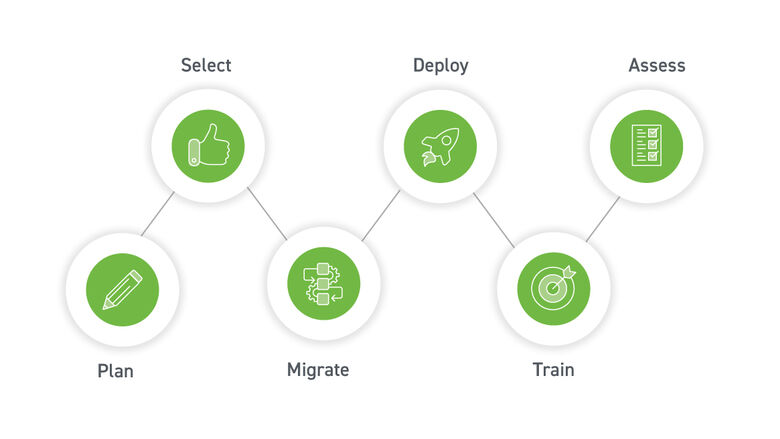An Enterprise Resource Planning (ERP) system functions as the backbone of a company's business practices and integrates and automates many internal processes and information systems across an organization. In our February 2024 article, Revolutionize ERP with Artificial Intelligence, we explored the evolution of ERP systems, how AI is augmenting the overall effectiveness and performance of these systems, and the various ways AI-enabled ERP systems are achieving strategic objectives across key business functions.
ERP projects can be costly, complex and risky, but they can also deliver significant value and competitive advantage to your organization. Selecting the right ERP solution and effective implementation of the technology will provide countless benefits. Nevertheless, even for the most prepared organizations, selecting the right solution and designing the most effective implementation and execution strategy can be a significant challenge.
In February 2024, Managing Director of Digital Advisory Services for Cherry Bekaert, George DelPrete, hosted a podcast on ERP selection and implementation with Jeffrey Yates, Assistant City Manager of the City of Fayetteville, and Zach Salvato, Chief Information Officer of the Greenville Spartanburg Airport. Both Yates and Salvato have performed several ERP selection and implementation projects throughout their careers and thoroughly understand the requirements and risks involved with such a significant undertaking. The podcast explores key factors to consider and pitfalls to avoid when going through the ERP system selection process.
What Is ERP System Implementation?
An Enterprise Resource Planning system is a digital platform that integrates fully into a business, helping it manage its different departments and functions, such as human resources, finance, sales, procurement, logistics and more. A well-organized ERP system standardizes the collection of data throughout the different parts of the organization, simplifying analysis and decision-making.
ERP System Implementation Process: General Steps
The implementation of an ERP refers to the process of integrating that system into the business. This could involve collecting and transferring historic data into the software, configuring the platform and its functions for the company’s specific needs, and even training personnel. Of course, the specific steps of the implementation can vary depending on the ERP system selected, the industry, the business, etc. — making an ERP implementation unique to each organization.
However, the overall implementation process will follow this general course:
- Creating an Implementation Plan: The ERP implementation process starts with planning a strategy. This can include creating a team of stakeholders to lead the process, choosing the business goals the ERP should focus on and determining the budget for the project.
- Selecting and Designing the System: Once the ERP implementation plan has been put in place, the team can focus on selection and comparing options to the predetermined requirements that matter most to the organization. To streamline the selection process, it may be necessary to categorize requirements based on their priority to the business’s operations.
- Migrating Business Data: With an ERP system selected, it is time for the installation and migration of historical information. Depending on the type of ERP system chosen, it may take some time for the vendor to set up the necessary infrastructure.
- Deploying the System: After data has been added to the new ERP platform, the system can be tested to help ensure it is functioning properly. The project team should communicate clearly with the vendor and key stakeholders at this point. If any issues are discovered, notify both groups as quickly as possible.
- Training Employees: To help support the new ERP system, employees should receive training on how best to use the new platform. These trainings can be role-specific to better ensure a smooth implementation process for the wider organization.
- Assessing User Feedback: Lastly, it’s vital to evaluate the success of the implementation plan and review any feedback that was generated by the deployment and utilization. This necessary step can help decision-makers assess the return on investment, effectiveness of automation and organizational productivity.
5 Considerations To Make During an ERP Implementation
While ERP implementation can vary between companies, there are key factors decision makers should evaluate through the process:
1. Identifying Your Business Needs and Goals
As mentioned above, prior to exploring available market solutions, it is paramount to have a clearly defined strategy and roadmap where the organization identifies and outlines its needs and goals. “Understanding what you are trying to accomplish and how you want to use the ERP solution to update and automate your processes is the first step an organization should take before even considering a solution,” commented Yates.
Identifying the problems that need to be solved and what features and capabilities are necessary to support business operations will help organizations narrow down options and zero in on the right solution. This includes taking a comprehensive look at your current systems and identifying areas where improvements can be addressed by an ERP system. Having this clarity will help establish that you are selecting an ERP solution that provides the capabilities needed versus having to build those capabilities into a system later.
“I don't allow customization,” emphasized Yates. “When you customize later in the process, when you get upgrades, when you get new staff, all the collective knowledge of why it is the way it is goes away eventually, and now you're left with something that doesn't match what the developers built. So, I've always been diehard into the camp of don't modify the software; modify your processes because it has enough.”
2. Selecting the Right Partner
Ensuring the organization has the right resources and expertise in place to drive a change initiative of enterprise magnitude will be critical. Partnering with an experienced consultant specializing in ERP solutions can help guide an organization through every stage of the process to help maximize its investment.
“A full ERP initiative from selection through implementation should be considered a journey,” remarked Salvato. “It’s important for organizations to understand ERP implementations are comprehensive, factoring in multiple systems and various data, and even with the most meticulous planning and expertise, an ERP initiative may extend years before finalizing.”
Beyond understanding the intricacies and capabilities of various solutions, an ERP consultant needs to natively understand your business. Often, critical items that impact an implementation are lost in translation if there is not a comprehensive understanding of the business.
“When we hired Cherry Bekaert for our ERP implementation, they were extremely useful because they understood the business of government accounting, governmental operations, and nuances like fund accounting,” stated Yates. “They weren’t making blind assumptions about our business. They truly understood our specific needs and guided us, leading with insights rather than inquiries. The experience was nothing short of excellent.”
3. Preparing for Implementation
“Preparing an implementation plan includes really taking a deep look at your people, processes and technology,” unanimously stated both Yates and Salvato. Identifying what resources are in place and where there are deficiencies will be important prior to launching any technology initiative.
“It’s important to outline up front what kind of experience you want in implementing an ERP initiative and ensuring you have all the resources in place to achieve that outcome,” emphasized Salvato. Launching an ERP initiative will involve expertise and time outside of daily job tasks from every functional business unit. “If you don't have the resources to do it, you really must think about either contracting out support or pausing the initiative. Some of the biggest haphazard implementations, or challenged implementations, are under-resourced implementations,” warned Yates.
4. Defining Key Roles and Governance
Ensuring you have the right leadership and consistent governance throughout the entire ERP project is paramount. “The sponsor of the project must be the executive team,” remarked Salvato. Every member of the executive team must understand the totality of the project, including vision and objectives, and be accountable for the successful outcome of the initiative.
An ERP system involves all functional areas of a business, and thus, each area should have a lead stakeholder in place to plan, provide feedback, and implement and/or oversee testing for their functional area. Functional lead stakeholders will be able to review project details from their practice perspective, plan for how next steps will impact performance, provide feedback and test nuances when needed.
5. Prioritizing Communication
Partners, sponsors and key stakeholders should be in constant communication throughout each phase of the ERP project. “Holding monthly or bimonthly meetings with key stakeholders to discuss status updates, insights and expectations was instrumental in our ERP implementation. Stakeholders are then able to contemplate the implications of next project steps and manage accordingly,” stated Salvato.
Important to the start of any ERP initiative is ensuring the organization fully understands the vision, objectives and outcomes of the ERP implementation. Communication with the entire organization must remain fluid to maintain the project’s imperative and focus. Regular communication and status updates on the ERP project, including any challenges, are key contributors to a successful implementation. Communication helps with ensuring absolute clarity on an enterprise-wide initiative — a necessity.
Identification and successful implementation of an ERP system can transform an organization’s operations by improving efficiencies and streamlining processes, providing companies with the edge they need to compete. The selection and implementation process, although complex, can be done efficiently with the right stakeholders, proper preparation and proactively addressing potential pitfalls.
Enterprise Resource Planning Implementation FAQs
There are numerous advantages of using an enterprise resource planning system, but the key benefits include:
- Improved Data Collection and Hygiene
- Increased Support for Compliance Efforts
- Higher Productivity
- Streamlined Decision-Making Processes
- Quicker Reporting
The complete timeframe for a system implementation will depend on the size of your business, the scope of the project and the platform chosen. However, it can take anywhere from a few months for a small business to several years for an international organization.
Like most forms of technology, an enterprise resource planning system should be routinely updated or upgraded to maximize function and ensure efficiency. The exact timing will depend on the business and the system used, but an upgrade/update should be considered every 5 – 10 years.
Of course, if you notice certain issues while using your ERP, it might need maintenance more frequently.
While hiring an ERP consultant can require additional costs, it could be well worth the investment. Implementation specialists are well-versed in creating an ERP roadmap and the common pitfalls to avoid throughout the process. They can also provide support and maintenance after the platform has been deployed.
Consultants can best serve organizations that have limited human resources, lack experience with the process, work in a complex industry or just want a smooth implementation from start to finish.
How Cherry Bekaert Can Guide You Forward
Integrating an ERP system into your business enhances agility, scalability and competitiveness, empowering organizations to adapt to dynamic market conditions and drive growth effectively. Cherry Bekaert can help your organization with digital transformation or ERP-related issues. This includes strategy development, validation, selection and project assurance. To learn more about how we can help with your ERP system implementation and deployment, please reach out to us today!






